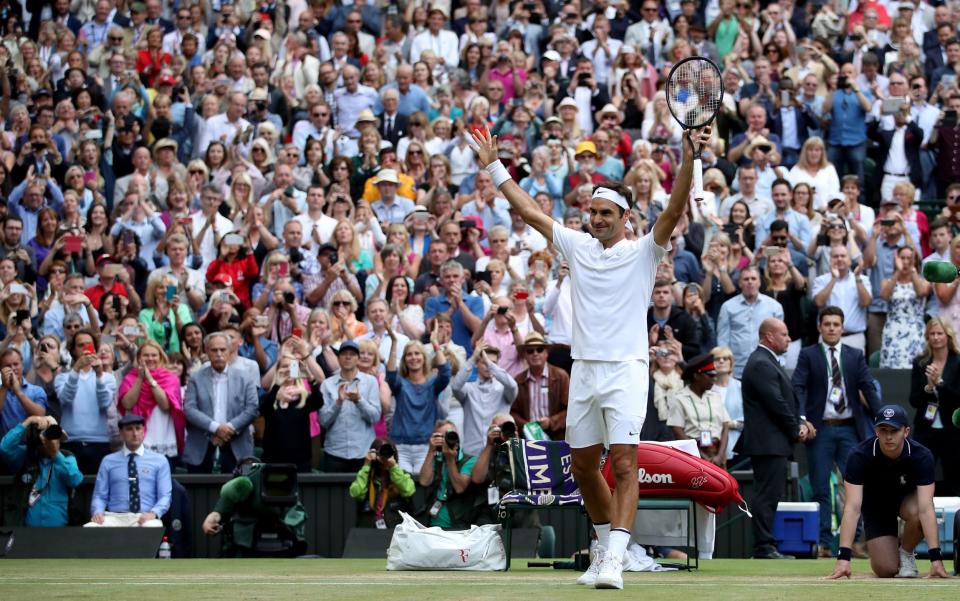Jewels of Britain's sporting summer planning for capacity crowds after vaccine launch

Organisers of Wimbledon, the Open, Royal Ascot and the British Grand Prix have begun stepping up plans to host capacity crowds next summer after the first coronavirus vaccine was approved for use.
The announcement that the UK had become the first country to deem the Pfizer vaccine safe to be rolled out was also hailed as a major boost for the staging of the postponed Olympics and European Championship in front of spectators.
On the day that crowds returned to sport in England after the country’s nine-month fan ban was finally lifted, Matt Hancock, the Health Secretary, proclaimed the vaccine would bring about the end of the coronavirus crisis “by the spring”.
Telegraph Sport has been told that would be too late for the likes of the Six Nations and Cheltenham Festival to take place without social distancing still being in force, while the Grand National may also have to operate with a reduced capacity.
But Britain’s traditional sporting summer – which was decimated by Covid-19 this year – was very much on course to return.
Telegraph Sport revealed last week that Lord’s had become the first major sporting venue to declare it was planning for “full ground capacity” next season thanks to vaccine breakthroughs and the England & Wales Cricket board on Wednesday said it had already begun selling tickets on a similar basis for men’s international matches, with a spokesperson adding: “We’re excited about the season ahead and believe it has the potential to be a truly wonderful summer of cricket.”
The All England Club said it had also been planning for a full-capacity Wimbledon as part of a range of potential scenarios and that Wednesday's news had increased the odds of it coming to pass.
A spokeswoman added: “Any potential enhancements to the public health situation, such as the introduction of vaccination programmes, will support us as we develop the detail of these scenarios, but it is naturally too soon to understand the impact at this point in time.”
The R&A hailed Wednesday's “hugely positive” news, a spokesman adding: “We were already progressing our plans for staging the 149th Open at Royal St George’s with a full capacity and it is certainly very encouraging that a vaccine is about to be rolled out. We recognise that it is still a volatile situation, however, and are developing contingency plans in case they should be required.”

Royal Ascot declared it was “really looking forward to welcoming the public back later this month, albeit in small numbers to begin with”.
A spokesman added: “This begins the journey to something that will hopefully resemble a recognisable summer. Events like the Derby and Royal Ascot stretch way beyond racing circles and are part of our social fabric and the prospect of people being able to enjoy them in larger than expected numbers is tremendous news.”
Stuart Pringle, the managing director of Silverstone Circuits, said: “We are planning, with more confidence following the vaccine news, to welcome fans back to our circuit next spring and remain cautiously optimistic that we will be able to operate at full capacity.”
The first such crowds are likely to be witnessed at club level in football and rugby, as well as within horse racing.
The governing bodies of the former two sports were silent on Wednesday following the vaccine news but a Racecourse Association spokesman said: “Such news gives hope that real progress is being made in the fight against the virus and that this will materialise in the lifting of certain restrictions, enabling us to welcome back larger numbers of spectators at the earliest safe opportunity.”
England’s opening Euro 2020 match against Croatia on June 13 could be the first major international event in the UK with a full crowd, with Scotland’s game against Czech Republic following 24 hours later.
Uefa president Aleksander Ceferin said: “I have always been optimistic about the prospects of a vaccine. Today’s news is a great boost for sport and for the Euro. I am confident it will mean that the matches scheduled to take place in England and Scotland next summer will be able to go ahead with many more fans in the ground than many were predicting. Congratulations to everyone involved.”
Thomas Bach, the president of the International Olympic Committee, said plans were being drawn up to make next year’s Games “a signal of hope and resilience to all humankind”.
He added: “In this way, the Olympic flame can be the light at the end of the dark tunnel that we are currently in.”
Crowds in England are currently capped at 2,000 and the vaccine rollout will not halt work to fast-track their return in much larger numbers through measures such as rapid Covid-19 testing and digital health passports.
The Government had no plans on Wednesday night to include “vaccine passports” among those measures after the minister overseeing the rollout of coronavirus vaccines, Nadhim Zahawi, said earlier this week it was “probable” venues such as cinemas and sports venues would want to see an immunity passport as a prerequisite to entry.